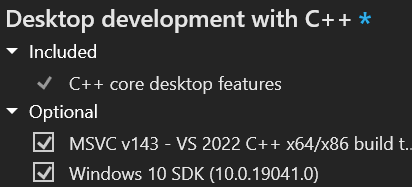This repository contains:
- workflows for building Rust fork esp-rs/rust with Xtensa support
- binary artifacts in Releases
- Xtensa Installation
- RiscV Installation
- Building projects
- Podman/Docker Rust ESP environment
- Devcontainers
Download installer from Release section: https://github.com/esp-rs/rust-build/releases/tag/v1.61.0.0
curl -LO https://github.com/esp-rs/rust-build/releases/download/v1.61.0.0/install-rust-toolchain.sh
chmod a+x install-rust-toolchain.shInvoke-WebRequest 'https://github.com/esp-rs/rust-build/releases/download/v1.61.0.0/Install-RustToolchain.ps1' -OutFile .\Install-RustToolchain.ps1Following instructions are specific for ESP32 and ESP32-S series based on Xtensa architecture.
Instructions for ESP-C series based on RISC-V architecture are described in RiscV section.
- Linux:
- dependencies (command for Ubuntu/Debian):
apt-get install -y git curl gcc ninja-build cmake libudev-dev \ python3 python3-pip libusb-1.0-0 libssl-dev pkg-config libtinfo5
- dependencies (command for Ubuntu/Debian):
No prerequisites are needed for macOS
./install-rust-toolchain.shRun
./install-rust-toolchain.sh --helpfor more information about arguments.
Export variables are displayed at the end of the script.
Following instructions are specific for ESP32 and ESP32-S series based on Xtensa architecture.
Instructions for ESP-C series based on RISC-V architecture are described in RiscV section.
- Visual Studio - installed with option Desktop development with C++ - components: MSVCv142 - VS2019 C++ x86/64 build tools, Windows 10 SDK
Installation of prerequisites with Chocolatey (run PowerShell as Administrator):
Set-ExecutionPolicy Bypass -Scope Process -Force; [System.Net.ServicePointManager]::SecurityProtocol = [System.Net.ServicePointManager]::SecurityProtocol -bor 3072; iex ((New-Object System.Net.WebClient).DownloadString('https://community.chocolatey.org/install.ps1'))
choco install cmake git ninja visualstudio2022-workload-vctools windows-sdk-10.0
./Install-RustToolchain.ps1Export variables are displayed at the end of the output from the script.
Installation of different version of toolchain:
./Install-RustToolchain.sh --toolchain-version 1.61.0.0 --export-file Export-EspRust.ps1
source ./Export-EspRust.ps1
Following instructions are specific for ESP32-C based on RiscV architecture.
Install the RISCV target for Rust:
rustup target add riscv32i-unknown-none-elf-
Get example source code
git clone https://github.com/ivmarkov/rust-esp32-std-demo.git cd rust-esp32-std-demo/ -
Build and flash:
cargo espflash --target <TARGET> <SERIAL>
Where
TARGETcan be:xtensa-esp32-espidffor the ESP32(Xtensa architecture). [Default]xtensa-esp32s2-espidffor the ESP32-S2(Xtensa architecture).xtensa-esp32s3-espidffor the ESP32-S3(Xtensa architecture).riscv32imc-esp-espidffor the ESP32-C3(RiscV architecture).
And
SERIALis the serial port connected to the target device.cargo-espflash also allows opening a serial monitor after flashing with
--monitoroption, see Usage section for more information about arguments.
- Get example source code
git clone https://github.com/espressif/rust-esp32-example.git cd rust-esp32-example-main - Select architecture for the build
Where
idf.py set-target <TARGET>
TARGETcan be:esp32for the ESP32(Xtensa architecture). [Default]esp32s2for the ESP32-S2(Xtensa architecture).esp32s3for the ESP32-S3(Xtensa architecture).
- Build and flash
idf.py build flash
Alternatively, some container images, with pre-installed Rust and ESP-IDF, are published to Dockerhub and can be used to build Rust projects for ESP boards:
- idf-rust - contains only the toolchain.
- idf-rust-examples - includes two examples: rust-esp32-example and rust-esp32-std-demo.
Podman example with mapping multiple /dev/ttyUSB from host computer to the container:
podman run --device /dev/ttyUSB0 --device /dev/ttyUSB1 -it docker.io/espressif/idf-rust-examples
Docker (does not support flashing from container):
docker run -it espressif/idf-rust-examples
If you are using the idf-rust-examples image, instructions will be displayed on the screen.
There is also the option to integrate with Visual Studio Code using remote containers. With this method, we would have a fully working environment to build projects in Rust for ESP boards in VScode alongside useful settings and extensions, for more information, please, refer to esp-rs-devcontainer.
